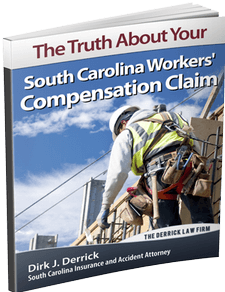Healthcare Staff Can Get Workers' Compensation
If you suffer any of the injuries or illnesses listed above in the course and scope of your healthcare job in Florence, you may not sue your employer in most cases. Instead, you’re entitled to file a workers’ compensation claim for your medical expenses and two-thirds of your lost income, as well as vocational re-training or disability benefits in some cases. If you’ve lost a loved one due to a healthcare work-related injury or illness, you may file for workers’ compensation death benefits.
Workers’ comp is no-fault insurance that covers employees’ work-related accidental injuries and occupational illnesses. Because it’s no-fault coverage, you need not prove that your employer did anything wrong to cause your injury or illness. Even if it was your own fault, you might still file a claim, and your employer may not fire you or retaliate against you in any other way for doing so. Nearly every South Carolina business or company with four or more employees is required by law to carry workers’ comp insurance.
Filing a Workers' Compensation Claim In Florence, SC
You should report any work-related accidental injury to your employer or workplace claims administrator as soon as possible after it occurs. If you develop an illness over time as a result of performing your job duties, you should report that illness as soon as it’s diagnosed. Although you have 90 days to report an accidental injury, you should not wait. Any delay in reporting could be cited by your employer’s insurer as evidence that you’re not seriously injured or ill.
If your employer does not immediately file your claim with the South Carolina Workers’ Compensation Commission (SCWCC), you should do so by using Form 50 from the SCWCC website. You must then see a doctor certified by your employer’s insurance company. You may not simply choose your own doctor; doing so could hurt your claim. Adhere strictly to the certified doctor’s medical advice and treatment plan, take all medications as prescribed, show up for all appointments and treatment sessions, and keep receipts and documentation of your treatments. It’s also a good idea to keep a daily journal of your recovery process and your ability or lack of ability to perform the tasks that your job requires.
Workers' Compensation Eligibility In South Carolina
While most South Carolina employees are eligible for workers’ compensation, there are some exceptions:
- Federal employees of the state (who have their own Federal workers’ comp system)
- Employees of a business with fewer than three workers or an annual payroll of less than $3,000
- Casual or as-needed workers
- Most independent contractors receiving 1099 wage statements
- Commissioned real estate agents
- Agricultural and railroad employees
- Officers of limited liability corporations (LLCs)
- Sole proprietors
- Business partners
- Anyone who intentionally self-inflicts an injury
- Anyone under the influence of drugs or alcohol at the time of the accident
- Anyone hurt in the process of committing a crime
If you’re ineligible for workers’ comp or your employer does not carry coverage, you might be able to claim compensation for your injury or illness from the South Carolina Uninsured Employers’ Fund. You might also be able to file a personal injury suit directly against your employer. A workers’ comp lawyer can determine your eligibility and advise you on how to proceed in your quest for fair benefits.
Third-Party Liability In Regards To Workers' Compensation
Although an eligible employee generally may not sue an employer that carries workers’ comp for a work-related injury or illness in Florence, you might be able to sue a third party who negligently or intentionally causes you to be hurt. If, for example, an angry relative of one of your patients attacks and injures you in your workplace, you could file a personal injury suit against that party. If a piece of medical equipment that’s provided and serviced by an outside company malfunctions and injures you, you might have a claim against the manufacturer of that equipment.
In such a case, your workers’ comp claim and your lawsuit will have different deadlines and procedural requirements. An experienced workers’ comp attorney can guide you through the process of simultaneously filing a workers’ comp claim against your employer and a personal injury lawsuit against a third party. In the lawsuit, you may claim damages for pain and suffering that result from your injury, whereas workers’ comp does not cover pain and suffering.
Have You Been Injured On The Job In Florence?
If you've been hurt at your job in or around Florence, South Carolina, you can speak with a workers' compensation lawyer. Please contact us online or call our Florence personal injury office directly at 843.488.7540 to schedule your consultation. We are also able to meet clients at our Charleston, Conway, Myrtle Beach, Murrells Inlet, Mt. Pleasant, North Myrtle Beach or North Charleston office locations.
|
Related Links: |



